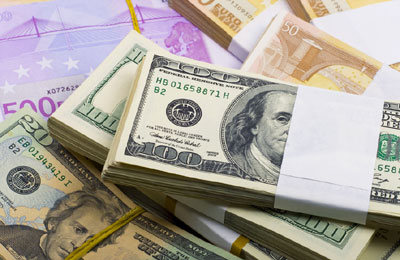
G7 expected to cool currency rhetoric
Moscow, February 12, 2013
The Group of Seven nations are considering a statement this week reaffirming their commitment to "market-determined" exchange rates in response to heating rhetoric about a currency war, G20 officials said on Monday.
The language, which could be subject to change, implies that the major powers would not indulge in unilateral currency devaluation and reads very similarly to the last statement issued by the G7 on currencies in 2011.
"It focuses on a commitment to market-determined exchange rates and (governments) not using policies to drive currencies," one official said.
Two officials from different countries told Reuters that if agreed, the statement could be released around the time G20 finance ministers and central bankers meet in Moscow on Friday and Saturday. The G7 comprises the US, Germany, France, Britain, Italy, Canada and Japan, while the G20 includes both advanced and emerging nations.
"The G7 has a long-standing set of rules of the game on exchange rates," US Treasury Undersecretary Lael Brainard said in Washington at a briefing for reporters ahead of the G20 meeting.
"The G7 has long committed that exchange rates should float, except in rare circumstances where excess volatility or disorderly movements might warrant cooperation," she said, sidestepping a question on whether the G7 would issue a statement.
US and European officials are concerned about comments from Japanese officials that suggest Tokyo is targeting a specific level for the yen. Japan's new government has pressed for an aggressive expansion of monetary policy, and the yen has lost 15 percent against the dollar since October.
Last week, France went as far as calling for a medium-term target to be set for the euro out of concern the exchange rate had become too strong. Berlin rejected that suggestion and said it did not view the currency as being overvalued.
French Finance Minister Pierre Moscovici said he and his euro zone peers would discuss closer cooperation on exchange rate policy at a meeting on Monday.
"We should have - I have insisted that this debate takes place - a coordinated approach between us that will allow for us to argue for exchange rate stability, especially within the G20," he said upon arrival in Brussels.
The EU's top monetary official, Olli Rehn, made a similar call at the weekend, noting the particular problems a strong euro would pose for southern, highly indebted members of the euro zone.
But any action beyond a bland statement remains a long way off.
Some analysts said the very fact those problem countries in the currency bloc had not gone away could send the euro into reverse, negating the need for any policymaker action.
"The pace of the euro's gains in January made me feel uncomfortable, it was too far, too fast ... if news from Cyprus, Spain and Italy is not good we could see $1.30 again," said Jane Foley, senior currency strategist at Rabobank.
Since late last year, the euro has climbed more than 10 cents from below $1.27 before subsiding in recent days after European Central Bank chief Mario Draghi indulged in a bit of gentle verbal intervention, saying he would monitor the impact of a strengthening currency.
On Friday, Japanese Finance Minister Taro Aso said the yen had weakened more than intended during its recent decline to around 90 against the dollar from around 78 yen a few months ago.
MONEY PRINTING
The US Federal Reserve and Bank of Japan are expanding their balance sheets rapidly by printing money, while the ECB's balance sheet is tightening, partly due to banks paying back early cheap money the central bank doled out last year.
All else being equal, that could drive the euro yet higher as others explicitly or implicitly follow policies that will drive their currencies down - the last thing a struggling euro zone economy needs.
Any pain will be just as acute in emerging markets.
As newly minted cash pours into developing economies in search of higher yields, either their exchange rates will rise, making exports less competitive, or they will have to cut interest rates and/or intervene to hold down their currencies. That could fuel credit and asset price booms that sow the seeds of inflation.
Brazilian Finance Minister Guido Mantega, the man widely credited with coining the term currency war, told Reuters last week that it could get even worse if Europe joins the fray.
The issue will be discussed in Moscow, but officials do not expect Japan to come under any serious pressure at this stage. - Reuters







